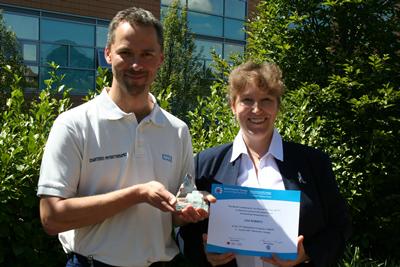Success Story
Dr Lisa Roberts facilitated clinical research with Stuart Fraser at Southampton General Hospital. Here, Stuart tells us the story of his experiences in research and how Lisa has helped him.

I have never classed myself as an academic, and always thought of "research" as something done by academic individuals, lovers of statistics, and people who hide away in libraries for months on end.
However, as a "clinician", you cannot help questioning certain clinical beliefs and practise. The outcome of this questioning is that it leads you to the evidence base behind the clinical practise, and ultimately, that leads you to "research"!
So I had a simple clinical question, "what was Cauda Equina Syndrome". I thought I knew. The texts books state that it is something for clinicians involved in back pain to be very worried about, and is seen as an emergency. So if it was that bad, how come we were seeing patients admitted for whom the symptoms had apparently not been identified for some time? So the question "what was Cauda Equina Syndrome" kept niggling away at me.
So I asked some advice on what to do, what happened next was a very smooth, seamless journey. First I found a research mentor, and then I conducted a literature search and had help from clinical colleagues to read through the articles, and design a simple framework for extracting information. A simple diary system for meeting up and discussing information found in the articles seemed to work well alongside our normal clinical work.
After a few months, my simple question had created 25 pages of information from over one hundred articles. My smooth, seamless journey had just become a struggle up an enormous mountain range! I was hanging on!
But this is where a research mentor steps up a gear, and helps you find a simple path through the rough times. The outcome of a few meetings was that my 25 pages of "data" had become just a few, and what a few pages they were. The "data" questioned our beliefs on all aspects of Cauda Equina Syndrome. This was really interesting information for clinicians. So I did a presentation of the findings to the staff at work. It was received very well, so well in fact that the presentation was taken to a national spinal conference, then an international conference in Canada. The data was formulated, with assistance from the mentor, into a paper format and subsequently published in a leading academic journal circulated worldwide!
So do I class myself as an academic? Not really - I am a clinician who questions things. And if you question or challenge ideas, you need to be prepared to where this may take you, and you will need a research mentor on your journey. You are not alone in the world of research and with their assistance, you may remain a clinician, but one who has published, presented, and been involved in fantastic, valuable areas of research.